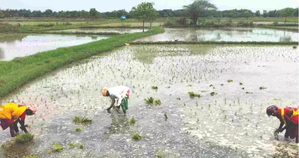New Delhi: The Government e-Marketplace (GeM) on Monday said it has revamped and introduced 170 seed categories on the portal to simplify access to quality agricultural and horticulture seeds for farmers.
“Created ahead of the upcoming cropping season, the newly populated categories feature nearly 8,000 seed varieties that can be procured by Central and State PSUs and other governing bodies for further dissemination across the country,” according to an official statement issued on Monday.
Created after consultation with stakeholders including state seed corporations and research bodies, seed categories on GeM portal offer a ready framework for seed procurement, incorporating the extant rules & regulations by Government of India and necessary parameters, easing the entire process for procuring authorities.
The roll out of these new categories is a part of GeM’s broader strategy to promote category-based procurement through the portal. With an emphasis on increasing efficiency, the move aims to reduce time consumed in tendering processes, stimulate transparency and accountability in government procurement, while facilitating increased participation of sellers across the country.
“We invite sellers to leverage these new seed categories and list their offerings to participate freely in government tenders. We also encourage seed corporations and state bodies to utilise these new categories for cost-effective procurement of quality seeds” said Roli Khare, Deputy CEO, GeM.
Prime Minister Narendra Modi had released 109 high-yielding, climate resilient and biofortified varieties of crops in August this year as part of the Centre’s strategy to increase crop production and enhance farmers incomes.
The new seeds were released at the India Agricultural Research Institute in the national capital where he also interacted with the farmers and scientists on the occasion.
These 109 varieties were meant for 61 crops which include 34 field crops and 27 horticultural crops. Among the field crops, seeds of various cereals including millets, forage crops, oilseeds, pulses, sugarcane and cotton were released. Among the horticultural crops, different varieties of fruits, vegetable crops, plantation crops, tuber crops, spices, flowers and medicinal crops will be released.
The Prime Minister highlighted the importance of sustainable farming and adoption of climate resilient methodologies. He has also emphasised on promoting the biofortified varieties of crops by linking them with the several government programmes like Mid-Day Meal, Anganwadi, etc., to make India free from malnutrition.
–IANS


Comments are closed.